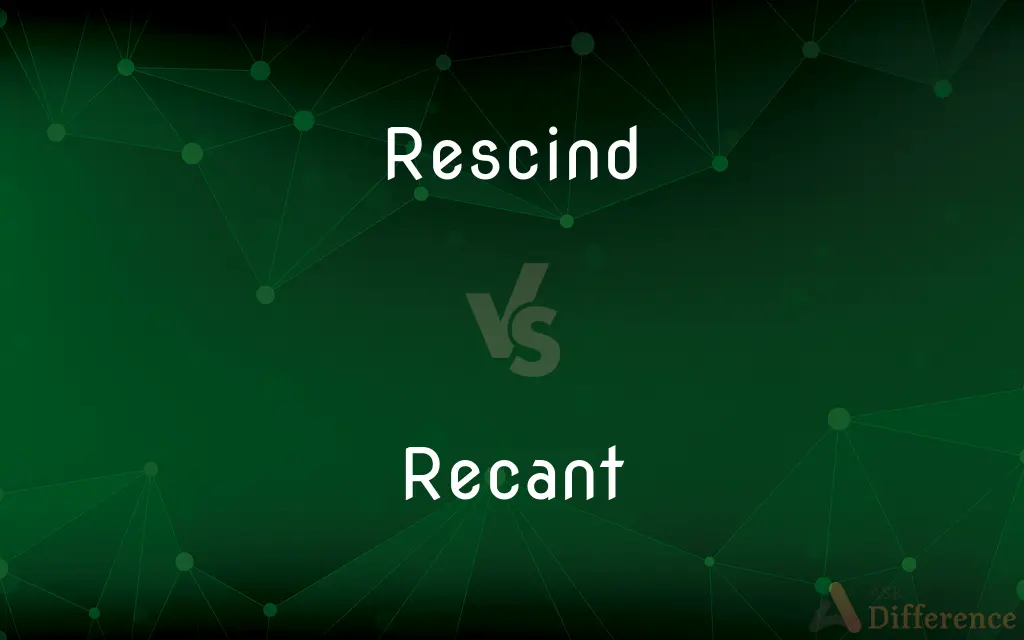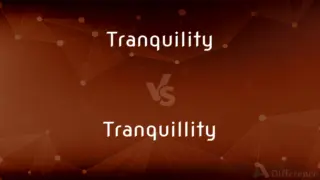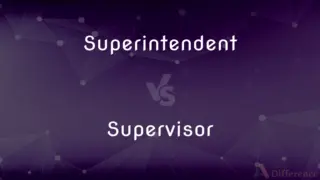Rescind vs. Recant — What's the Difference?
By Tayyaba Rehman & Fiza Rafique — Updated on April 3, 2024
Rescind involves the revocation of a decision or agreement, while recant is about withdrawing a statement or belief.

Difference Between Rescind and Recant
Table of Contents
ADVERTISEMENT
Key Differences
Rescind and recant both involve the idea of taking something back, but they apply in different contexts. On the other hand, recanting is specifically about publicly withdrawing or disavowing a previously held opinion, belief, or statement, usually under the implication that the original statement was incorrect or misguided.
While rescission usually involves legal documents, contracts, or formal decisions, recantation is more about speech, beliefs, or written statements. A contract can be rescinded, negating its terms and obligations, whereas a person recants a statement or testimony, often to correct a previous error or to align with the truth or new beliefs.
The implications of rescinding vs. recanting can differ significantly. Rescinding is often a neutral action, dictated by changes in policy, strategy, or circumstances. In contrast, recanting is more personal and can imply an admission of fault or a change in one's understanding or beliefs, potentially affecting the recanter's credibility or reputation.
While both actions are forms of reversal, the reasons behind them can be very different. Rescinding is often driven by external factors, such as changes in law, policy, or organizational direction. Recanting, however, is usually motivated by internal factors, such as a change of heart, mind, or the acquisition of new information that contradicts previous assertions.
Comparison Chart
Definition
To revoke, cancel, or repeal (a law, order, or agreement).
To say that one no longer holds an opinion or belief; to withdraw a statement or belief.
ADVERTISEMENT
Context
Legal, contractual, and formal decisions.
Personal beliefs, statements, and public declarations.
Implication
Neutral, often due to change in circumstances.
Often implies a mistake or misjudgment was made.
Action by
Typically an organization, authority, or legal body.
An individual or sometimes a group.
Connotation
Administrative or procedural.
Personal or ethical.
Compare with Definitions
Rescind
To annul or abrogate an agreement or contract.
The company rescinded its job offer when it found a more qualified candidate.
Recant
To formally withdraw or deny one's previous statements or beliefs.
Under pressure, the witness decided to recant his testimony.
Rescind
To repeal a standing order or policy.
The new administration rescinded several policies of its predecessors.
Recant
To reject a previously supported idea or statement.
The church demanded that he recant his heretical ideas.
Rescind
To officially revoke or cancel (a decision, law, or agreement).
The government decided to rescind the controversial law after widespread protests.
Recant
To take back a statement or belief publicly and formally.
After years of criticism, the politician recanted his earlier views.
Rescind
To invalidate an action or document.
The university rescinded the degree awarded to the student due to academic dishonesty.
Recant
To retract a previously held opinion or statement.
The scientist recanted her earlier theory in light of the new evidence.
Rescind
To withdraw or revoke formally or officially.
The court rescinded the previous ruling in light of new evidence.
Recant
To disavow or renounce publicly.
The author recanted his previous support for the controversial law.
Rescind
To make void; repeal or annul.
Recant
Say that one no longer holds an opinion or belief, especially one considered heretical
Heretics were burned if they would not recant
Galileo was forced to recant his assertion that the earth orbited the sun
Rescind
(transitive) To repeal, annul, or declare void; to take (something such as a rule or contract) out of effect.
The agency will rescind the policy because many people are dissatisfied with it.
Recant
To make a formal retraction or disavowal of (a statement or belief to which one has previously committed oneself).
Rescind
(transitive) To cut away or off.
Recant
To make a formal retraction or disavowal of a previously held statement or belief.
Rescind
To cut off; to abrogate; to annul.
The blessed Jesus . . . did sacramentally rescind the impure relics of Adam and the contraction of evil customs.
Recant
(ambitransitive) To withdraw or repudiate a statement or opinion formerly expressed, especially formally and publicly.
Convince me that I am wrong, and I will recant.
Rescind
Specifically, to vacate or make void, as an act, by the enacting authority or by superior authority; to repeal; as, to rescind a law, a resolution, or a vote; to rescind a decree or a judgment.
Recant
To give a new cant (slant, angle) to something, in particular railway track on a curve.
Rescind
Annul by recalling or rescinding;
He revoked the ban on smoking
Lift an embargo
Vacate a death sentence
Recant
To withdraw or repudiate formally and publicly (opinions formerly expressed); to contradict, as a former declaration; to take back openly; to retract; to recall.
How soon . . . ease would recantVows made in pain, as violent and void!
Recant
To revoke a declaration or proposition; to unsay what has been said; to retract; as, convince me that I am wrong, and I will recant.
Recant
Formally reject or disavow a formerly held belief, usually under pressure;
He retracted his earlier statements about his religion
She abjured her beliefs
Common Curiosities
What are the legal implications of rescinding a policy?
Rescinding a policy can have various legal implications, including the cessation of its enforcement and potential adjustments to related procedures or agreements.
What does it mean to rescind a contract?
To rescind a contract means to revoke, cancel, or repeal the agreement, rendering it void as if it never existed.
Can a public statement be rescinded?
Public statements are typically "recanted" rather than "rescinded." Rescinding is more commonly used with formal decisions or agreements.
What is required to rescind a policy or law?
Rescinding a policy or law typically requires an official action by the governing body or authority that enacted it.
Can a person recant a belief for personal reasons?
Yes, individuals often recant beliefs due to personal growth, new information, or changed perspectives.
What does it mean to recant testimony?
To recant testimony means to withdraw, retract, or deny one's previous statements made under oath.
Can an organization recant a statement?
Organizations can recant previous statements, often doing so to correct misinformation or update their stance.
What's the difference between rescinding an offer and revoking it?
Rescinding and revoking an offer both imply withdrawal, but "rescind" often involves formal or legal contexts, while "revoke" can be more general.
Why would someone recant a public declaration?
Reasons include acknowledging incorrect information, changing beliefs, or responding to new evidence.
How does public reaction influence the decision to recant?
Public reaction can significantly influence an individual or organization's decision to recant, especially if the reaction is overwhelmingly negative.
Is recanting a statement an admission of guilt?
Recanting can imply an admission of error, change of opinion, or correction of a previous statement, but it doesn't always equate to admitting guilt.
Is it possible to rescind a law?
Yes, legislative bodies can rescind a law, effectively removing it from the legal code.
Can rescinding an agreement be challenged?
Yes, the legality of rescinding an agreement can be challenged in court, especially if one party disagrees with the rescission.
Does recanting affect credibility?
Recanting can affect an individual's credibility, depending on the context and the reasons for recanting.
Share Your Discovery

Previous Comparison
Tranquility vs. Tranquillity
Next Comparison
Superintendent vs. SupervisorAuthor Spotlight
Written by
Tayyaba RehmanTayyaba Rehman is a distinguished writer, currently serving as a primary contributor to askdifference.com. As a researcher in semantics and etymology, Tayyaba's passion for the complexity of languages and their distinctions has found a perfect home on the platform. Tayyaba delves into the intricacies of language, distinguishing between commonly confused words and phrases, thereby providing clarity for readers worldwide.
Co-written by
Fiza RafiqueFiza Rafique is a skilled content writer at AskDifference.com, where she meticulously refines and enhances written pieces. Drawing from her vast editorial expertise, Fiza ensures clarity, accuracy, and precision in every article. Passionate about language, she continually seeks to elevate the quality of content for readers worldwide.















































